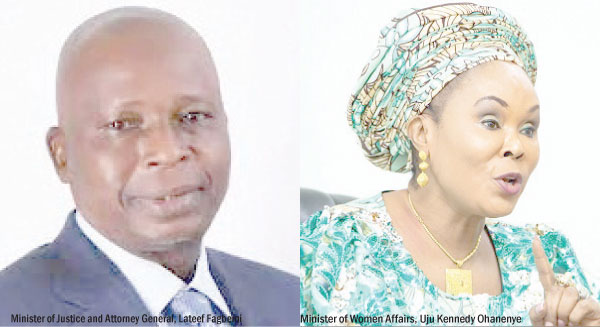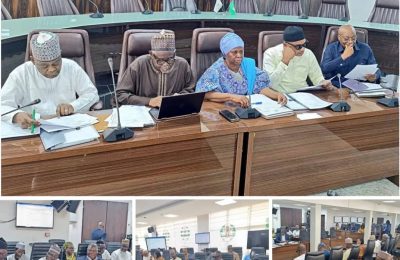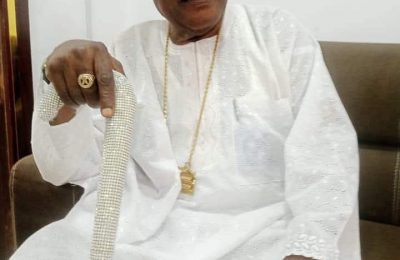
Childlessness is a challenge in many homes in Nigeria and the law has made provisions to meet such needs through adoption which is not a novel experience. However, while adoption is a solution for concerned couples, many still shy away from this process. YEJIDE GBENGA–OGUNDARE, in this piece, examines legal framework regulating adoption in Nigeria, the problems facing the child adoption system and factors that discourage people from exploring the alternative of adoption to infertility.
A middle aged woman (name withheld) who lost her home due to her inability to give birth to children after almost 10 years of marriage stated that the issue of childlessness is a major burden on women as they bear the brunt more, adding that while adoption is viable, not all men or their families appreciates the idea of adoption. According to her, “I tried all I could but nothing happened, all medical tests showed that I had no medical issue stopping conception but monthly, I face the heartache of being unable to conceive, I was also unfortunate to have in-laws that were abusive; they violated my emotional and psychological wellbeing and the house became unbearable.

“We tried everything and it failed, my in-laws believed that I had a bad past and that is the reason I couldn’t conceive and we were not financially able to try IVF because we were told there were no guarantees, so borrowing wasn’t an option. At a period, I suggested adoption and that was the beginning of my challenge. My husband became cold and distant, he felt I knew I couldn’t have a child and only deceived him into getting married. That was the beginning of the end as he lost the hope that I could ever have a child.
“It was then that I realised that he doesn’t believe in adoption and wasn’t willing to bring up another man’s child; he believed that an adopted child can never be part of his household and his family members were not interested in bringing a strange child into their family. And after a while, he asked for divorce.”
Children are an integral part of every family especially in the African society where indigenous customs and traditional practices still largely govern the beliefs of the people. The absence of children in a family leads to different kinds of challenges ranging from strained relationship among in-laws, mental health issues to depression or even breakup of the marriage. In the African society, the expectation is that every marriage should produce biological children.
Howerver, this is not always the reality as some couples are not that fortunate to fulfill this societal expectation as they grapple with issues like unexplainable condition, barrenness due to health issues, loss of pregnancy or non-survival of children. To this set, the obvious resort is adoption, which offers an alternative which makes it possible for them to have children which they can legally call their own, with all the rights, privileges and responsibilities over such children as if they were the biological parents.
Adoption is a legal process whereby the rights and responsibilities of the natural parents of a child is transferred to another person known in law as adoptive parents; all the rights the natural parents have over a child, all the responsibilities which include shelter, feeding, education, healthcare, clothing etc will be transferred to the person adopting the child. The child automatically becomes the adoptive parent’s child and the child also bears the adoptive parent’s name.
However in Nigeria, while adoption is not a novel practice due to the provisions of such in the Nigerian Family Law, many challenges have hampered the smooth running of the process with many highlighting what they term the prolonged and several bureaucratic bottlenecks.
While a large number of infertile couples is familiar with child adoption, like the husband of the divorced woman, various social and cultural factors and misconceptions associated with adoption have impaired their ability to accept it as a solution. But this seems to be a thing of the past as advocates believe that this is not the reason many people shy away from adoption again.
Speaking to the Nigerian Tribune on adoption process, the country director of La Vie Mot Global Mission (LIWOM), a nongovernmental body that focuses on child welfare and advocacy that has a mission home for orphaned children and a member of the Oyo State Sexual and Gender Based Violence Response team (Oyo SGBVRT) stated that there is no difficulty in adopting a child.
“In my opinion, child adoption is not difficult; it depends on how one looks at the procedure and the expectations. I do not think people run away from adoption except that cultural views make people stay away even though they want it,” he added.
But some people have had experience of extortion while trying to adopt a child. A victim of such, Sade (surname withheld) stated that when she was looking for a child, she faced series of extortions and had to give up after which she had a child at the age of 47.
“I had tried everything, I even tried IVF once but it failed. So I and my husband decided to try adoption because his mother felt if I took care of a child, it may open the way for me. We were told to try orphanages and I visited up to five with my husband but the experience was not a good. At a point my husband stopped following me, he said if I get and he needed each, he will show up.
“At every of the homes, after paying for registration and to checking the children out, once we saw a child we wanted because we needed babies less than a year old, they will ask us for outrageous amounts. In fact, after the third one, my husband said he wasn’t sure the children were not stolen or taken from baby factory because he didn’t believe that adopting a child legally will run into millions. After a while, I also gave up because my husband had lost interest and I thank God that I even got my own.”
Her story resonates with diverse stories (some unsubstantiated) that orphanages trade children to the highest bidder, who may not have qualities needed to get a child if due process is followed while many interested families quietly apply for children and even spend years on the waiting list. Indeed, an investigative report by a journalist, Fisayo Soyombo exposed how homes sell children to the highest bidder.
It has been said that people now avoid orphanages and homes especially privately owned homes when seeking adoption because of the exorbitant amounts demanded. In an interview, the founder of Little Saints Orphanage in Lagos, Mrs. Dele George, said as the first non-governmental indigenous orphanage approved by the Lagos State government in Nigeria which has adhered strictly to the policy and practice of the government in its operations over the years, it has rehabilitated, reformed and re-integrated children who have had to overcome traumatic experiences such as abandonment, rejection, abuse and even modern-day slavery.
“We can also boast of having the highest number of children to be adopted by any orphanage. The orphanage works in collaboration with the Ministry of Youth and Social Development in Lagos State, and the Ministry of Women Affairs in other states of operation on issues of adoption, care and protection. We have received numerous awards for our demonstration of excellence in charity and child welfare. The orphanage currently operates in four states of the country and is a member of the Association of Orphanages and Homes Operators in Nigeria (ASOHON).
“So, with all that we have achieved and accomplished due to our relentless hardwork and commitment, you will agree with me that it won’t be difficult for us to abide by the government’s policy and code of conduct. When people come here to enquire about our process of adoption, they complain that the process is too stiff and difficult, but that is not the case. The truth is that they expect you to do their bidding and neglect the guidelines of the Child Adoption Act, which we are obligated to,” he said.
His views tally with that of Marcus Williams who stated that child adoption is easy if people are willing to follow the guidelines which many think is too cumbersome and leads them to following the wrong path and falling victims of extortion especially by orphanage operators that don’t adhere to laid down rules.
Provisions on adoption matters are laid out in the Child Rights Act, which in most cases are not being adhered to by orphanage operators today as supervised by the Ministry of Women Affairs and Social Welfare or the Ministry of Youth and Social Development in states
A child rights advocate, Julianah Bako stated that the unscrupulous homes get away with underhand practices and extortion due to a breach in the adoption chain, adding that there seems to be no synergy between the government and orphanages.
“The truth is any orphanage that asks for millions or any huge amount is a thief because the government does not charge exorbitant fees for child adoption from any government-approved orphanage. The only challenge for the adopters is that they have to go through the process of coming for interview sessions with the ministry and the duration to wait. It is that time frame that they complain about; they seem to forget that the government cannot just give out children without ensuring they don’t get into the wrong hands. That is why they fall victim of extortion, desperation and a willingness to cut corners make them vulnerable,” she added.
Guidelines on child adoption process
Adoptive parents must agree on what they want, read through the relevant laws guiding adoption and basically be ready to go through laid down process.
They must be ready to follow due process and go through the legal route to adopt a child. Also, they must ensure that adoption papers are signed by the appropriate body, either the permanent secretary or commissioner of the agency in charge of adoption.
It is important to have the required information to avoid legal consequences.
They must have ready social support from family and friends before the child is given to them to avoid unforeseen issues.
Prospective adoptive couples need to ensure that the proper documentation for the child is secured to avoid issues in future.
All tests must be conducted: Adoptive parents must insist on and ensure several tests such as the Human Immunodeficiency Virus test, all required tests, blood group and genotype tests as well as a genetic health and state of the child check is carried out. Indeed, they must insist that necessary medical, cognitive; eye and hearing tests were carried out on the child before adoption process is completed.
Adopting a child from the government orphanage
As a prospective parent, walking into any orphanage to adopt a baby is a false start; there are laid down procedure to follow depending on the type of orphanage; government-owned orphanages and private owned orphanages.
Below are steps in adopting a child from the government orphanage:
The prospective parent will write and submit a formal application letter of request to adopt a child to the Permanent Secretary, Ministry of Social Welfare & Rehabilitation.
The Director of social Welfare will fix an interview with the prospective parents. It is in the interview, the prospects will state the sex of the baby they want and the age bracket of the baby. They will be asked their occupation and other personal details.
Forms will be given to the prospective parents to fill and submit back to the Ministry and obtain list of requirements.
Administrative processes/ screening sessions
A date will be fixed for the inspection of the home of the prospective parents to ascertain whether it is conducive to shelter a child. They will also find out if it’s a rented apartment or not.
After the inspection the prospective parents will wait for the approval of their application. Once the application is approved, the parents will be called upon to pick up the approval letter
Collection of letter of approval to search for an adoptable child in government-approved homes; Payment of prescribed fees
There will be mandatory pre-counseling session (on appointments), panel session, post counseling (proper parenting)
With the approval letter, the prospective parents can go to any government orphanage to collect a child if it is available. Once the child is picked up the couple will engage the services of a lawyer to legalise the process in court.
Challenges of adopting a child from an orphanage
There are many challenges inherent in adopting a child from an orphanage but this doesn’t stop the homes from being the best option for adoptive parents that want to go the legal route.
The challenges include corruption on the side of some orphanage officials, even in government owned orphanages who ensure the highest bidder and not the most qualified adoptive parents, gets a child by circumventing the process, delay in getting a baby because of a usually long waiting list even after approval letter has been issued (at times, some officials scuttle the list to favour other people down the line) and the list can keep you in line for months or years.
Also, another challenge is the fact that the genealogy of the child is unknown as most children in the orphanage home have unknown parents which makes it difficult to determine the likelihood of likely hereditary challenges.
Also, many of the private orphanages are not duly registered and this may be dangerous as adoptive parents may face extortion or even get into legal problems.
Adoption as a process is a lifeline to so many people but it requires being patient and willing to do it right; duly search and ascertain that the orphanage is duly registered and be prepared to follow legal requirements and procedures no matter how long it may take. Also, get a lawyer.
READ ALSO: UPDATED: Two more govs ready to pay N70,000 new minimum wage








